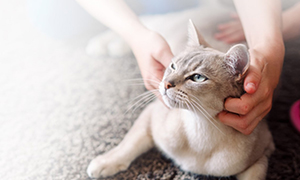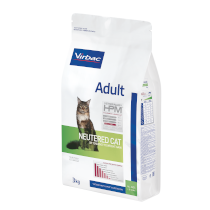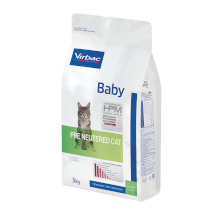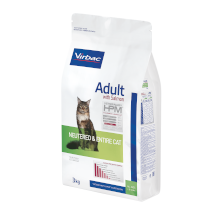
Cat Obesity: How To Help Your Cat Lose Weight
An obese cat is not a happy or healthy cat. Unfortunately in cats the consequences of obesity are harder to observe as compared to the canine companions. However, over time, their reduced mobility, sluggish movements, and increased risk of health issues make obesity a significant concern for cat owners. If your feline friend is struggling with obesity, it is crucial to take proactive steps to help them shed those extra pounds and regain their vitality. Read on to understand the causes of cat obesity, how to determine if your cat is overweight, and practical steps on how to help cat lose weight.
Understanding the Causes of Cat Obesity
Obesity in cats occurs when they consistently consume more calories than they need. Several factors can contribute to cat obesity, including overfeeding, inactivity, whether they have been sterilized, lifestyle, breed, age, and genetics. Recognizing these factors and addressing them is essential if you have been looking for ways on how to help a cat lose weight.
How to Tell If Your Cat Is Overweight?
Before you can help your cat lose weight, you need to determine if they are, indeed, overweight. You can do this at home without the need for a scale. Here is how:
- Rib Check: Gently run both hands, palms down, across both sides of your cat's rib cage. You should be able to feel their ribs without pressing too hard.
- Profile Check: Look at your cat from the side. You should be able to see a slight waistline behind their ribcage.
- Overhead Check: Stand above your cat and look down. You should be able to see an hourglass shape rather than a round or oval one.
If you cannot feel your cat's ribs or see their waistline, then your cat is probably overweight. However, for a precise assessment and to determine their ideal weight, consult your veterinarian for a thorough wellness check. Recognizing these signs is the first step in learning how to help a cat lose weight.
Creating a Weight Loss Plan
Once you have confirmed that your cat is overweight, you can effectively learn how to help a cat lose weight and improve their overall health and well-being. Start by working on a cat weight management plan. Remember the mantra: "High protein, low carbohydrates, more physical activity, more mental stimulation.
What is the Right Food for Weight Loss?
Learning how to help a cat lose weight involves providing the right nutrition and monitoring their intake closely. Nutrition plays a key role in cat weight management. Consult your vet before making any changes to your cat's meal plan, as drastic changes can lead to health issues. Drastic changes in the diet, in particular, can be harmful to cats, potentially triggering liver disease. Your veterinarian may recommend a therapeutic food specially formulated for weight loss. These foods are typically high in animal protein and fibre, lower in carbohydrates and fats. Thus designed to ensure your cat gets nutrients that are closest to its natural needs and also provide a sense of fullness for longer duration.
Additionally, it is crucial to reduce or eliminate unnecessary calories from treats and table scraps. Your cat will appreciate the extra attention, cuddles, and playtime instead.
How Can Exercise and Fitness Help a Cat Lose Weight?
Cats are known for their sedentary nature, but it is essential to get them moving, especially if they are overweight. You can become your cat's personal trainer by engaging them in activities such as playing with small toys they can chase or self-play toys, or as simple as even crumpling up a piece of paper for them to pounce on. Variety and rotation in toys are key to keep them interested and active.
Consider incorporating exercise into their feeding routine by using puzzle feeding boxes. These keep your cat mentally engaged and its mind off wanting to constantly eat. By understanding how to help a cat lose weight through regular exercise and mental stimulation, you can significantly improve your cat's overall health and well-being.
How to Prevent Future Weight Gain?
To maintain your cat's ideal weight once they have reached it, establish a regular feeding schedule. Most cats prefer smaller, more frequent meals in day, such as about 4 to 5 meals in a day. Observe your cat's eating habits and adjust their meal practices accordingly. It is important that all members in the household avoid deviating from this feeding routine and avoid giving in everytime your cat begs for food. While your cat may resist these changes initially, they will ultimately benefit from a healthier, more active lifestyle.
Avoid rewarding good behaviour or food-begging with treats and instead opt for playtime, toys or petting, as per their preferences. Rember, learning how to help a cat lose weight and maintain it involves consistency.
Conclusion
Helping your obese cat lose weight is not only about their appearance but also their overall health and well-being. By working closely with your veterinarian, providing a diet that respects their carnivorous nature, encouraging regular exercise, and maintaining a consistent feeding schedule, you can learn how to help a cat lose weight. The effort you invest in their weight management will lead to a happier, more active, and longer-lasting companionship, ensuring your cat enjoys the best possible quality of life.
Take a look at our best cat food range.
1. How do you treat an obese cat?
To treat an obese cat, begin with a consultation with your veterinarian to assess your cat’s ideal weight and rule out underlying health issues. Develop a structured weight loss plan that includes a high-protein, low-carbohydrate diet, portion control, regular exercise, and mental stimulation. Avoid free feeding and reduce high-calorie treats. Consistency, patience, and veterinary guidance are key to effective cat weight loss.
2. Is it bad for cats to be obese?
Yes, being obese is harmful to a cat’s health. It can lead to serious conditions such as diabetes, arthritis, liver disease, and heart problems. Additionally, an obese cat may experience reduced mobility, lower energy levels, and a decline in overall quality of life. Addressing excess weight promptly can prevent long-term health complications.
3. What is the lifespan of an obese cat?
An obese cat typically has a shorter lifespan compared to a healthy-weight cat. Studies suggest that obesity can reduce a cat’s life expectancy by up to 2.5 years. Chronic health conditions associated with obesity, such as diabetes and joint disorders, can significantly impact both the length and quality of a cat’s life.
4. How can I help my cat lose weight?
To help your obese cat lose weight:
- Switch to a veterinarian-approved, weight management diet.
- Stick to scheduled feeding times and avoid free feeding.
- Encourage physical activity through interactive play, puzzle feeders, and climbing structures.
- Reduce or eliminate calorie-rich treats and human food scraps.
- Monitor your cat’s progress and adjust the plan under veterinary supervision.
5. Can obesity in cats cause health problems?
Yes, obesity in cats is a major health concern. An obese cat is at greater risk of developing:
- Type 2 diabetes
- Osteoarthritis and joint issues
- Hepatic lipidosis (fatty liver disease)
- Heart disease
- Skin and grooming difficulties
- Reduced immune function
Managing your cat’s weight is essential for preventing these issues and ensuring a better quality of life.






